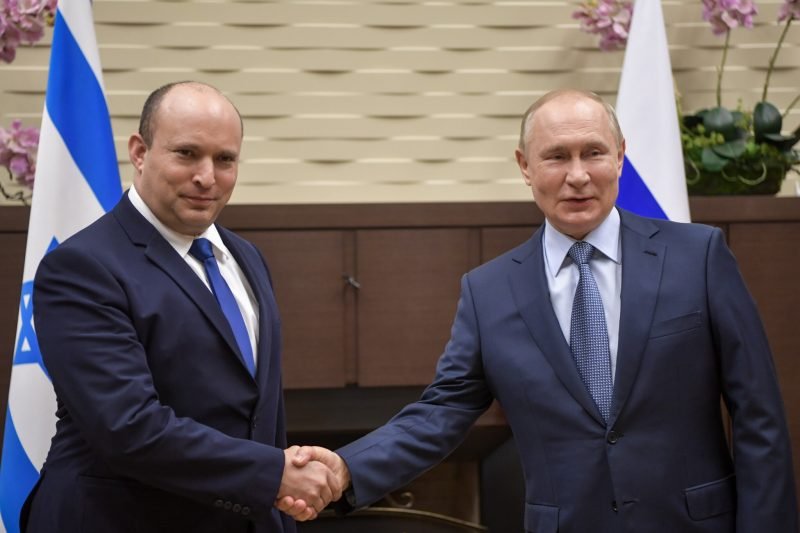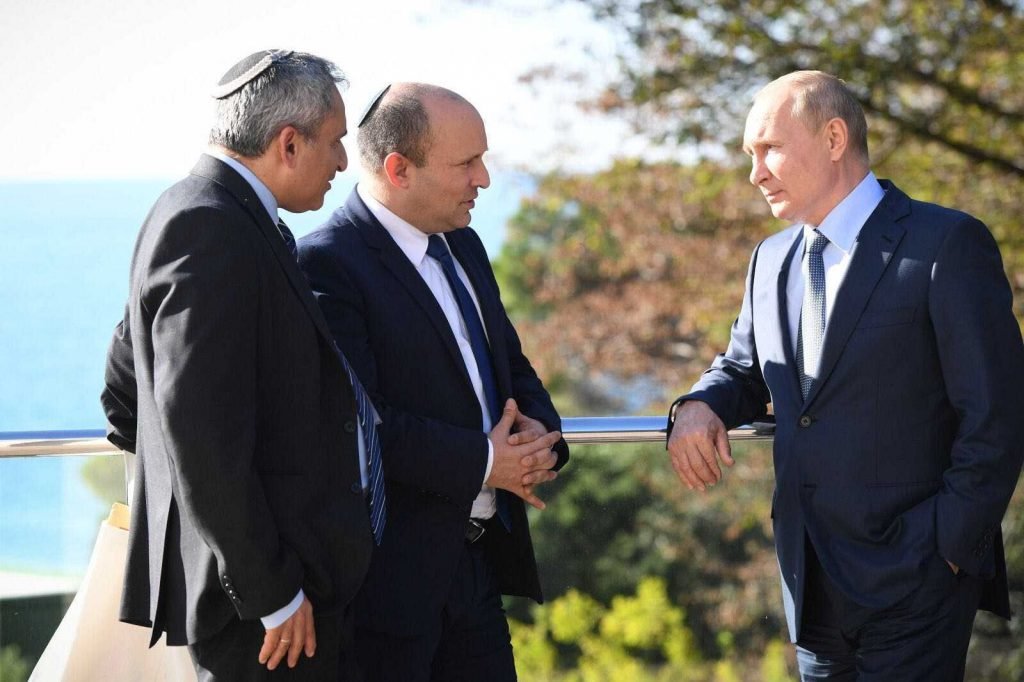Ukraine-Russia Conflict: Bennett treads mediation path eyeing Israeli Interests

As the world has been witnessing horrific developments in Ukraine for almost two weeks, the conflict between Russia and Ukraine does not seem to be coming to halt. Though humanitarian corridors have been set up in few cities following a brief ceasefire by Russia, but this does not seem to be a guarantee to the world community, seeking an immediate end to the ongoing conflict. Amid this critical stage of war Israeli Prime Minister, Naftali Bennett, took a rather bold initiative by offering mediation between Russia and Ukraine. In pursuance of this objective, he paid a surprise visit to Moscow On March 5th to meet Russian President Vladmir Putin.
Backed by the US support along with blessings of other Western nations, Bennett, during his trip also contacted Ukrainian President Volodymyr Zelensky. Acknowledging Israel’s cordial relations with both Russia and Ukraine, Zelensky requested Bennett to approach President Putin. Further, Bennett’s halt at Moscow was followed by his trip to Germany, from where he planned to possibly embark on trip to Paris, another influential player in the embroiled situation.
As per the unconfirmed local Israeli media reports, the discussions between President Putin and PM Bennett delved upon the important issue of ensuring safe and smooth passage for Jews to Israel from Ukraine and Russia. On his part, Putin specifically requested Bennett to ensure that Israel does not provide any military assistance to Ukraine. Israel and Russia’s military cooperation in Syria also figured in bilateral talks with Bennett reiterating Israel’s freedom to conduct military operations in Syria to eliminate anti-Israeli elements in the region.
Many experts view Bennet’s bold initiative with scepticism and express doubt over the outcome of visit. Despite this cynicism, Bennet should be credited for taking such a step when all the leaders from across the world were maintaining a safe distance. Many global leaders while offering lip-service for concrete action to end the crisis, were in fact desisting from plunging into such move. So far Israel has maintained a balanced stance on the current crisis and has been cautious in its approach by confining its activities only to giving of humanitarian aid to Ukraine. Unlike western nations, Israel desisted from extending any aid in the form of military equipment. Simultaneously, Bennett has also been very careful in his recent press conferences to cast aspersion on any one party to the conflict. This delicate balancing approach of Israel can be attributed to the fact that both Ukraine and Russia host significant population of Jews and by leaning on either side, Israel do not wish to infuriate the other side. However, the current stopover of Bennett at Moscow has invited criticism back at home, as the critics doesn’t want Israel to get embroiled in the ongoing war, which may prove harmful to its interests in future.

Significantly, Prime Minister Bennett’s unexpected visit to Moscow may also be seen in the broader context of Israel’s concerns over the ongoing negotiations in Vienna on Joint Comprehensive Plan of Action (JCPOA), also known as Iran Nuclear deal. Despite world’s attention shifting from the Iranian Nuclear Deal to the current crisis in Eastern Europe, Israel has not lost its focus from this critical nuclear deal even in the ongoing conflict. Israel is well aware that most of the sanctions and restrictions on Iran’s nuclear program will expire by the end of 2025, plus Iran will immediately witness an influx of funds post-lifting of US sanctions. Tehran can use these funds for its proxy warfare across the Middle East. As the renewed Iranian deal is just few weeks away, hence Israel continue to remain concerned. Additionally, as per media reports, after the signing of the new JCPOA, US is also looking to remove Iranian Revolutionary Guard Corps (IRGC), from the US designated list of terrorists along with lifting of sanctions on individual IRGC members, who are primarily involved in waging proxy wars in the Middle East. Such a move may not only prove catastrophic for the Israel’s national security but may also cause major destabilization in the security order of Middle East. Simultaneously, such a move would also have a potential to attract those Arab nations, including Saudi Arabia, who are not currently part of Abraham Accords, to seek normalization of relations with Israel to counter the Iranian threat.
Bennett’s meeting with Putin is in fact acknowledgement of the fact that Russia was instrumental in facilitating the Iran Nuclear Deal talks by bringing its ally Iran to the negotiating table. Now, with the ensued sanctions by the West in the backdrop of ongoing war between Russia and Ukraine, Russia has put forth demands that requires rather serious attention and assessment. Russia has threatened to pull out its support for the new Iran deal unless the Americans draw back from their sanction regime against Russia as punishment for its aggression. US, including western nations are aware of Russia’s imperative support for the renewed deal, hence, a unique scenario is evolving wherein while West is making efforts to put immense pressure on Russia to end the conflict, on the other hand, efforts are afoot to cooperate with Russia over the Renewed JCPOA. In this background, PM Bennett is aware that his mission to end the war between Russia and Ukraine, may be hailed as historic and welcome measure by the entire world, he was equally keen to exploit this opportunity to persuade Putin to prevent the appeasement of Iran by the US.
While the outcome of this courageous visit by the Israeli Prime Minister is not yet visible, one thing is certain that if Bennett’s visit succeeds in halting or getting some positive extractions for Israel from the renewed Iranian nuclear deal, Bennett’s popularity will rise to a higher level. However such a scenario is still in the air, and the only positive development one can expect on the ground from Bennett’s visit is possible ceasefire in coming days. If Bennett’s visit could herald such an achievement then his shuttle diplomacy would certainly be characterised as historic.



















